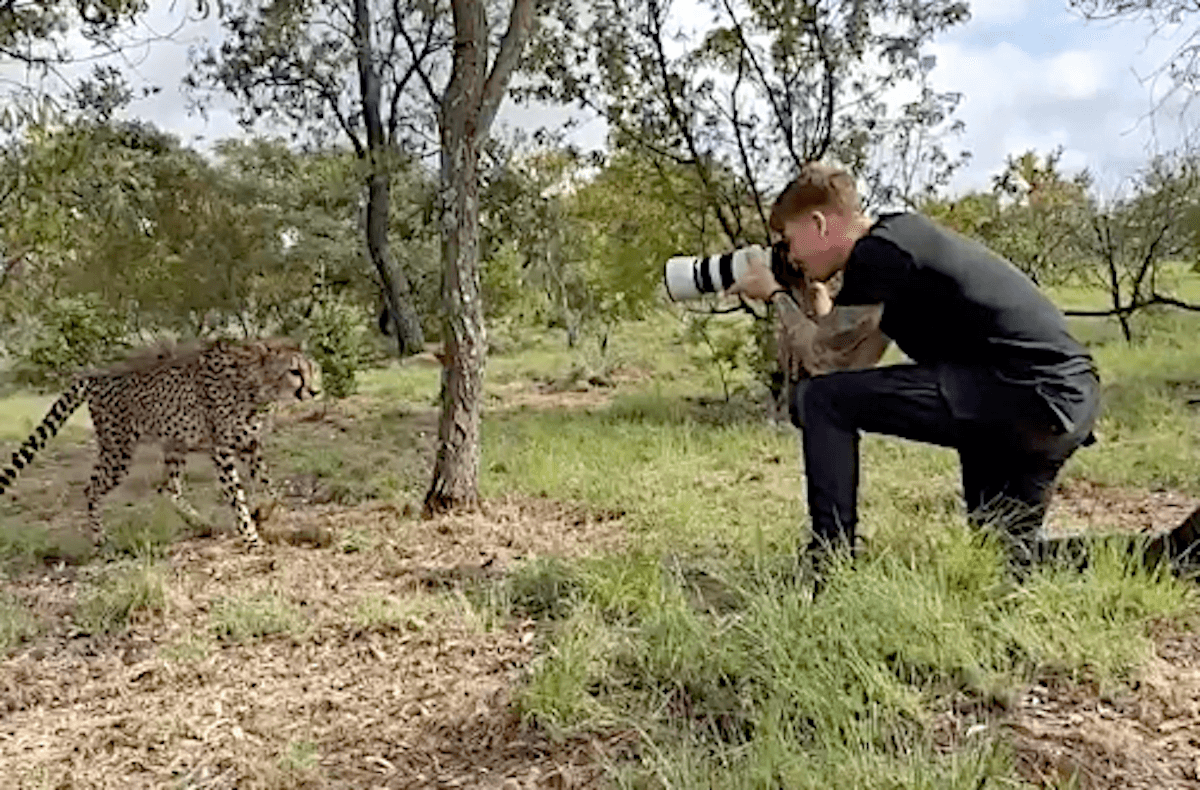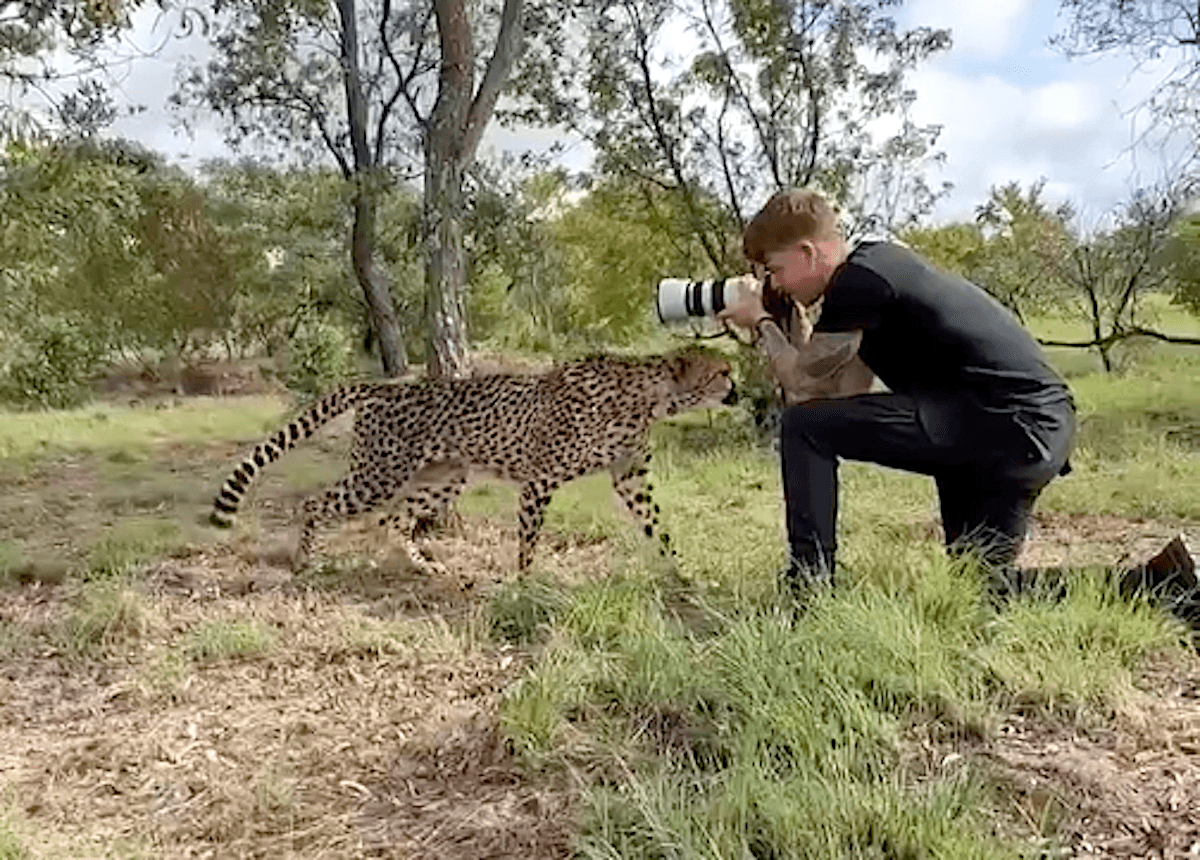
A wildlife photographer who was attempting to snap pictures of a cheetah at a nature reserve in South Africa got more than he bargained for when the wild animal approached him head-on.
Casey Mannes, 30, who originally hails from West Michigan, hosts wildlife retreats across the world throughout the year.

Early this year, Mr. Mannes noticed that a cheetah—which had stomach issues and was living in an animal sanctuary as it wouldn’t be able to survive in the wild on its own—approached him while he was snapping pictures.
“Cheetahs do have emotional responses with people they know well,” Mr. Mannes told The Epoch Times, adding that getting to this level of intimacy took weeks. Instead of approaching the animal, he allowed the cheetah to take its time getting used to his presence in the reserve. The moment the animal decided to come up to him was incredibly special, so he asked his friend to film it.
“It sounds corny, but it was a magical moment when the cheetah decided that it was ready to be that close to me and [trust] me,” Mr. Mannes said. “That’s a really vulnerable position for a cheetah to be in; it takes a long time to build up a relationship like that with a wild animal.”

.

However, Mr. Mannes stressed that he’d never recommend anyone try to replicate such a close encounter. Mr. Mannes said one of the reasons he thinks the cheetah was so friendly is because it currently lives alone.
“It doesn’t get to interact with other cheetahs; it doesn’t get to be social,” he said. “I would never interact with a cheetah that was in a reserve that was planned on being released back into the wild. Habituating wildlife like that to humans is a dangerous thing to do.
“So that’s the only reason why I would become emotionally connected and have any physical touch with him.”

.

Mr. Mannes moved to the backcountry of Alaska when he was 20. He spent summers flying bush planes and enjoyed spending time with wildlife and taking photos of them.
“I never had a goal to become a wildlife photographer,” he said. “I just wanted to be in nature, and experience these creatures and do everything I could to try to help them as much as possible.”
Specializing in working with predator animals such as sharks, bears, anacondas, leopards, cheetahs, and jaguars, the talented photographer has been obsessed with wildlife for as long as he can remember.
Growing up in a small town in Michigan, he started out searching for turtles and snakes but harbored dreams of Africa and Alaska.
A lot of the attraction to wildlife, he said, stemmed from difficult past experiences: “I used to be an addict, and I had a pretty rough upbringing. The adrenaline that comes just from being in the presence of predator animals, I think, is related to my addictive personality.”

Having been clean for the last 10 years, Mr. Mannes has succeeded in shifting his energy from drugs and alcohol to the awe-inspiring power of the natural world. The excitement he gains is not derived from putting himself in dangerous situations where an animal feels threatened, but rather from maintaining a respectful distance and recognizing the potential danger.
“These are dangerous animals,” he said, “but they’re not like murderers. They’re not seeking out to kill you just for fun.
“These animals, they do need to be respected, but they also don’t need to be feared at the level the average human fears them.”
Alongside his extensive experience being around predators, Mr. Mannes also assists in helping get animals back out into the wild; in particular, those captured in the illegal animal trade.
“I do a lot of work down in Bolivia for jaguars and ocelots,” he said, “and numerous monkey species. People think these animals would be good pets, and they take them out of the wild as babies and habituate them to be house pets.”
The wildlife expert also can’t stress enough that cheetahs shouldn’t be kept as pets.
“They’d be an awful pet. They belong in the wild – that’s where they’re supposed to be,” Mr. Mannes said. “This was just a unique circumstance, where the cheetah is unable to live in the wild and is being researched by scientists.”

To the young Mr. Mannes, such a touching moment shared with a cheetah would have seemed like a distant dream. For the adult photographer, the cheetah demonstrating affection was something completely unforgettable.
Through his experience, Mr. Mannes wants to express: “It’s the idea that they can actually kill you if they want to, but they choose not to. Being in their presence, knowing that they don’t really view you as food; it’s a captivating experience.”